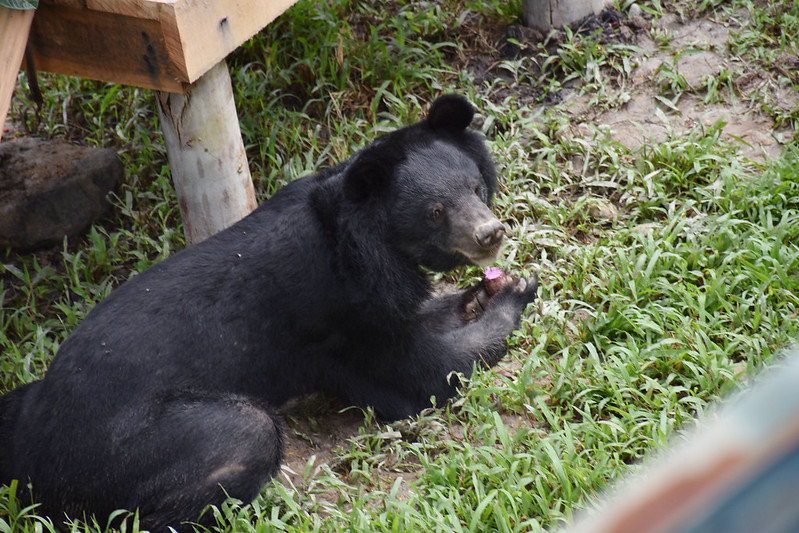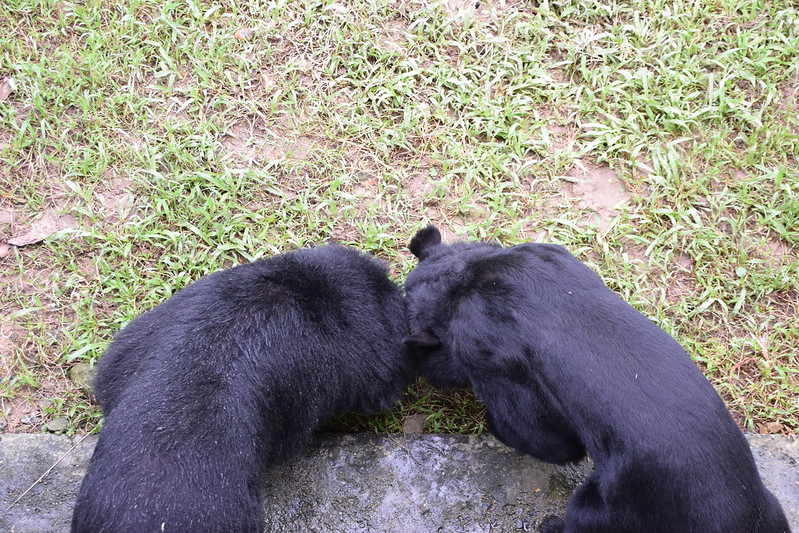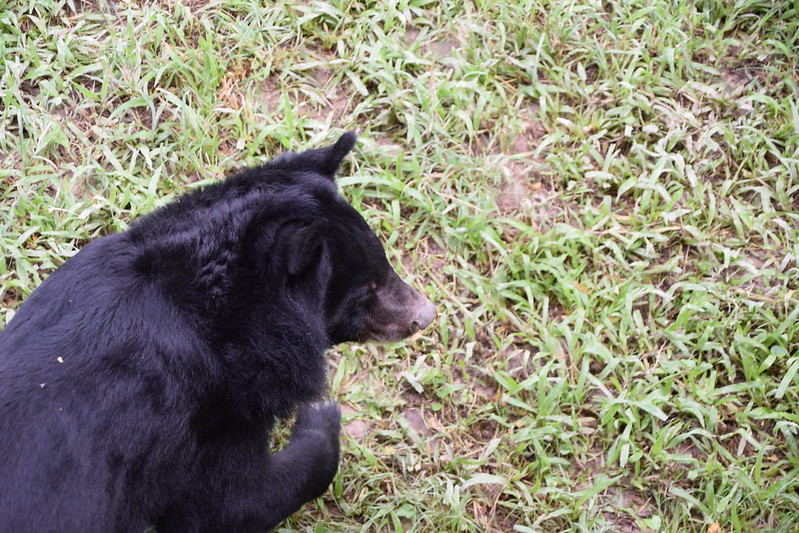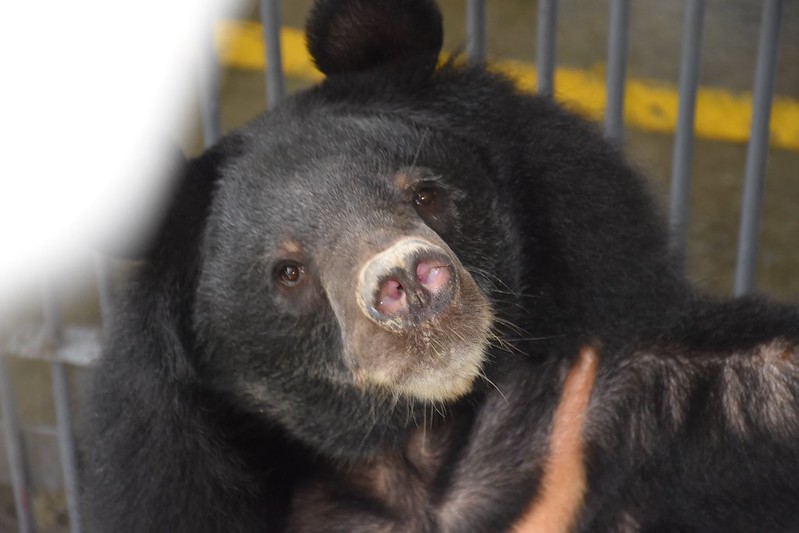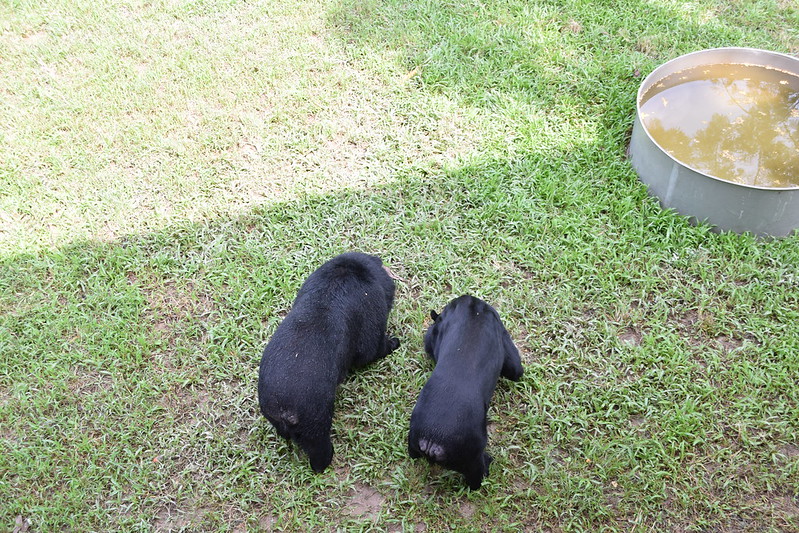For rescued bears, adjusting to life after cruelty requires constant care
12 October 2017
Since being rescued from a bear bile farm, nervous moon bears Binh An and Song Be are finding friendship and open space can be challenging too.
In June, moon bears Binh An and Song Be were rescued after enduring a decade of abuse in which they were confined in cages and had their bile forcibly extracted for use in traditional medicine.
In total, nine bears were rescued during the operation and brought to Animals Asia’s 11-hectare sanctuary.
Since then Song Be and Binh An have passed through quarantine, received health care and moved to a den – the largest space they have ever known.
Here, the newcomers soon drew the curiosity of the more established residents, who seemed interested to catch a glance of these potential future friends.
Then came the moment of truth, after a decade behind iron bars, Song Be and Binh An stepped outside into a world of pools, trees and wooden frames for climbing and playing.
Song Be was first out, although she did not venture far. She felt more comfortable keeping close to the entrance of the den where she found pieces of delicious dried fruit left by the team and barely dared touch the soft, but unfamiliar grass.
Similarly, after a couple of forays into the enclosure, Binh An retreated to the familiarity of the den. The enormity of the sky must have seemed too much for him.
But as the weeks have passed, Binh An has started to conquer his fears of the outdoors, steadily gaining confidence that the outside world is not a dangerous place.
Song Be has also persevered and has begun going as far as the grass in search of tasty treats.
Animals Asia Bear Manager Sarah Van Herpt said:
“Anyone who works with bears and has seen the utter horror of their lives on bear bile farms naturally longs to see them wandering a grassy enclosure. But we shouldn’t forget that exploring the great outdoors can be a huge and intimidating step for rescued bears.
“It can take time for them to adapt to their new, unfamiliar environment so we have to be patient and let their progress unfold at their own pace.
“Binh An is beginning to learn that the outside world means lots of lovely treats and fun toys to play with. He really takes confidence from Song Be and relies on her calm demeanour to help him as he grows braver and braver. We’re hopeful that in his own time Binh An will learn to love the outdoors.”
As well as adjusting to the outdoors, since being rescued Binh An and Song Be have also had to adjust to living together.
On the farm, they were kept separate from each other, able to see but never touch through the bars. But now sharing the safety of the sanctuary, each bear is learning how to get along.
When they first met, friendly, affable Binh An seemed pleased with his new playmate. After all, they have much in common, having suffered the same ordeal on the bile farm and the same experience of being rescued and given a new start at the sanctuary.
But it seems that shy Song Be had not quite made up her mind about Binh An. When he tried to wrestle with her, she simply pushed him away.
Binh An took the hint. Ever the gentleman, Binh An lived up to his Vietnamese name which means “peace” and gave Song Be, or “little river” in Vietnamese, her space while making reassuring noises as if to let her know he meant no harm.
Moon bears are not thought to be social animals in the wild but sanctuary staff know from experience that lasting friendships can be a hugely beneficial source of stimulation.
Animals Asia’s Vietnam Bear and Vet Team Director Heidi Quine said:
“Song Be and Binh An are doing really well. The enormity of the outdoors can be overwhelming for traumatised animals but we can see improvements each day as confidence is gained.
“We just have to hope too that Song Be will be won over by Binh An’s gentle charms. He’s really playful and it would be great for them both to be comfortable enough with each other to wrestle and play. Hopefully, it won’t be too much longer till we see them rolling on the grass together – then we’ll know they’ve left cruelty behind.”
In Vietnam, bear bile farming has been technically illegal since 1992, with species-specific regulations enacted in 2005.
However, despite the ban, the industry continues to operate due to legal loopholes.
In summer 2017, a landmark legal agreement was signed between Animals Asia and the Vietnam government which will see bear bile farming completely eradicated in Vietnam within five years.
BACK
